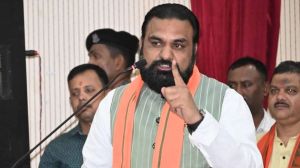GTRI’s Ajay Srivastava is guest at Explained.Live event today
To make sense of the rapidly changing contours of trade negotiations, former trade negotiator and head of the think tank Global Trade Research Institute (GTRI), Ajay Srivastava, will be the guest for the Explained.Live session at 6 pm.
 Ajay Srivastava
Ajay SrivastavaIndia could be just weeks away from signing a trade deal with the US — having already concluded talks with the UK and the European Free Trade Association (EFTA), and moving closer to finalising negotiations with the European Union (EU) — as it strengthens its economic integration with services-dominated Western economies.
Under US President Donald Trump’s tariffs threats, these negotiations have gained momentum five years after India withdrew from talks on the China-led Regional Comprehensive Economic Partnership (RCEP), a trade agreement that has improved manufacturing partnership among ASEAN countries such as Vietnam and Indonesia with China.
To make sense of the rapidly changing contours of trade negotiations, former trade negotiator and head of the think tank Global Trade Research Institute (GTRI), Ajay Srivastava, will be the guest for the Explained.Live session at 6 pm. Srivastava has decades of negotiating experience and has handled complex talks with countries ranging from Japan and Australia to the EU, the US, and ASEAN member countries. He will be in conversation with Ravi Dutta Mishra, Principal Correspondent, The Indian Express.
India’s strategy to integrate more deeply with the developed world is also facing unpredictability. Trump’s aggressive trade stance has not only reshaped global trade dynamics but is also influencing India’s domestic policy, creating fresh pressure to open traditionally protected sectors and to reform intellectual property laws in favour of American corporations.
Simultaneously, tensions are intensifying closer to home. China’s growing influence in South Asia — supported by infrastructure investments and trade incentives — adds another layer of complexity. Trade relations with Bangladesh have grown strained in recent months, as Dhaka pivots towards closer economic ties with Beijing. Renewed friction with Pakistan and its use of Chinese jets against India suggests that Islamabad’s trade and strategic proximity to China is deepening.







